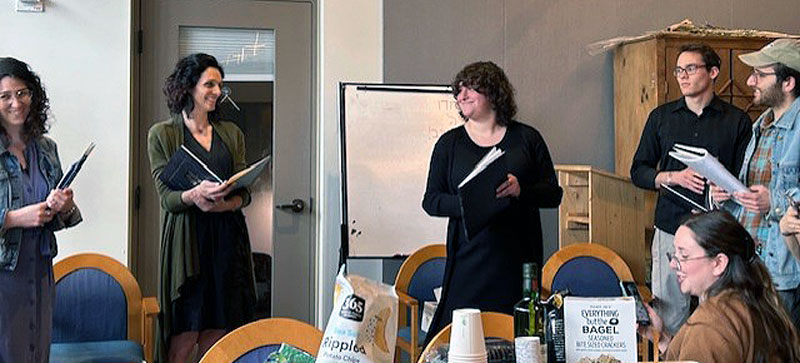Jewish learning “A Method of Encounter and Return”: Studying Gemara in Shana Alef

The Shana Alef year –the first of our five years in rabbinic school– is unique at Hebrew College because we study through an entire perek (chapter) of Gemara over the course of an academic year.
For students like me, this foundational year means encountering a new kind of learning, in new languages. It’s in large part about how to study to begin with.
Yet, the content of the text often has uncanny things to say to someone like me, too. For instance in Brachot 29b, we read about what to do when you remember you’ve forgotten a special seasonal insertion into the standard Amida prayers.The Gemara explores how far back you must go to correct your mistake.
(If we err and forget to say the rosh chodesh insertion in the avodah section, we return to the beginning of the >avodah section. What about if we remember we’ve forgotten only once we get to the hoda’ah section? We return to the avodah section. Same with remembering all the way into sim shalom. However, when we reach the end of the Amidah entirely, and only then remember we’ve forgotten the insertion?… at that point, we might be out of luck. We have to return all the way to the beginning of the Amidah, and recite the whole thing again to get the insertion part right!)
The text goes on to narrow the scope, to add ideas about our body positioning, and also habits around personal supplicatory prayers. But despite the Gemara’s practical tone and unsentimental language, the question hangs in the air:
What to do when you remember you’ve forgotten.
For someone like me who only figured out what the Amidah fully is, this year, this framing question makes me wonder something bigger: What do I do when I realize I never learned the Amida to begin with? How far back do I go to start over in my prayers?
Here, the Gemara is my answer, too. Not its literal content, which presupposes knowledge and practice I don’t have…yet; but its questions, and its orientation to learning.
Each day at Hebrew College I uncover some memory I didn’t know was mine – How to pray. What to pray. How to study in a cycle of learning and review.
I’d forgotten my family once knew this stuff. And when I learn Gemara, I remember for my family that we’ve forgotten. And what we’ve forgotten. And when I do, the practice of Gemara study itself models a method of encounter and return that allows me to “go back” and start –or continue– to personally step into memory, and personally step into a serious Judaism that values deep rote knowledge, but also has avenues that let me grow towards that knowledge every day.
The possibility of return is about more than study, more than prayer, more than practice, or belief, or religion, or culture. It’s a way of living – of being alive – where we encounter our learning in the form of shared living memory. We make it ours. We remember it already is ours.
There was a moment this year when I suddenly remembered that all the sages are dead. It’s just not my normal experience of them, so when something jarred me intellectually into fully realizing this fact, I almost cried.
I remembered that I had forgotten. But as I returned to the text, the sages … weren’t dead. They aren’t. It’s weird, and not true, but also true.
The Shana Alef year is unique because it’s the opportunity we have at the beginning of rabbinic school to remember we’ve forgotten something about traditional Jewish study. It’s the moment to “return” to whatever gaps each of us brings to this place, to start over and insert a proverbial additional prayer –to mark that we are learning how to learn, remembering how to remember, and finding LIFE mysteriously present in ways that exceed logic, and might even have something to do with the divine. The experience of learning in Shana Alef lets us insert all this into what will become our standard practice in our years ahead.
Monica Steiner is a Hebrew College rabbinical student entering shanah bet.

